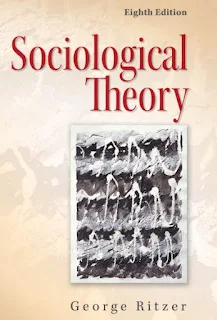 |
| Sociological Theory 8th Edition |
DESCRIPTION:
George Ritzer is a prominent
American sociologist known for his significant contributions to the field of
sociology, particularly in the areas of globalization, consumer culture, and
the development of the theory of "McDonaldization." His work has had
a lasting impact on the way sociologists and scholars analyze contemporary
society and culture.
1. Biographical
Background: George Ritzer was born on October 14, 1940, in upper
Manhattan, New York City. He earned his Bachelor of Arts from the City College
of New York and later completed his Ph.D. in sociology from the University of
North Carolina at Chapel Hill. He has held academic positions at several
universities throughout his career, including the University of Maryland and
the University of Delaware.
2. McDonaldization: One
of George Ritzer's most influential contributions to sociological theory is the
concept of "McDonaldization." In his 1993 book, "The
McDonaldization of Society," Ritzer argues that contemporary society is
increasingly adopting the characteristics of fast-food restaurants,
particularly the standardization, efficiency, and rationalization that are
associated with them. He identified four key components of McDonaldization:
· Efficiency:
McDonaldization emphasizes the use of the most efficient means to achieve a
goal. This often involves automation, predictability, and the division of
labor.
· Calculability: This
refers to the emphasis on quantifiable measures like portion sizes, waiting
times, and prices. Consumers are encouraged to focus on quantity rather than
quality.
· Predictability:
McDonaldized systems are designed to be predictable, which means that consumers
can expect the same experience every time they interact with them. This reduces
uncertainty but can lead to a loss of diversity.
· Control: McDonaldized systems
are highly controlled, both in terms of how employees are expected to perform
their tasks and how customers are expected to behave. This control is often
achieved through surveillance and regulations.
Ritzer's McDonaldization
theory has been widely used to analyze various aspects of modern society,
including education, healthcare, and bureaucracy, highlighting the ways in
which these areas have adopted the principles of efficiency and
rationalization.
3. Globalization:
George Ritzer has also made significant contributions to the study of
globalization. He argues that McDonaldization is a manifestation of the broader
process of globalization, where cultural elements and economic systems are
spreading globally. His work in this area explores how Western culture and
consumer practices have been disseminated around the world. Ritzer suggests
that McDonaldization, with its emphasis on uniformity and efficiency, is a key
driver of globalization.
4. Consumer
Culture: Ritzer's research on consumer culture delves into the
ways in which consumerism has come to dominate contemporary society. He
examines how the act of consumption has become a central feature of people's
lives, with individuals often defining themselves through their consumption
choices. Ritzer's work sheds light on the role of advertising, branding, and
marketing in shaping consumer culture and encouraging people to purchase
products and services as a means of self-identity and social status.
5. Prosumption:
Another concept developed by George Ritzer is "prosumption," which is
a fusion of the words "production" and "consumption." He
argues that in contemporary society, consumers are increasingly involved in the
production process, blurring the lines between producers and consumers. For
example, through activities like user-generated content on social media,
individuals actively contribute to the production and distribution of
information and entertainment.
6. Critiques
and Controversies: Ritzer's work has been both influential and
controversial. Some critics argue that his theory of McDonaldization
oversimplifies complex social processes and that it doesn't adequately account
for cultural and regional variations. Others contend that it focuses too
narrowly on negative aspects of globalization and consumer culture without
acknowledging potential positive aspects or the agency of individuals in
shaping their own choices.
7. Legacy
and Influence: Despite the criticisms, George Ritzer's work
has left a lasting impact on sociology and related fields. The concept of
McDonaldization, in particular, has been widely adopted and adapted by scholars
to analyze various aspects of contemporary society. It has also informed
discussions on topics like fast food, urbanization, and the impact of
technology on society. Ritzer's work continues to be a reference point for
scholars studying the effects of globalization and consumer culture on everyday
life.
In conclusion, George Ritzer's
contributions to sociological theory, particularly through his concepts of
McDonaldization, globalization, and consumer culture, have had a profound and
enduring impact on the field of sociology. His work has provided valuable
insights into the ways in which contemporary society is shaped by
rationalization, standardization, and the spread of Western consumer practices.
While not without its critics, Ritzer's work has enriched our understanding of
the complex forces at play in the modern world and remains a significant
reference point for sociological analysis.
Sociological theory is a vast
and multifaceted field within the discipline of sociology. It encompasses a
wide range of ideas, concepts, and frameworks developed by sociologists to
understand and explain the social world. In this comprehensive description, we
will explore the key components of sociological theory, its historical
development, major theoretical perspectives, and its contemporary relevance.
Historical Development of
Sociological Theory
Sociological theory has
evolved over the centuries, responding to changing social, political, and
intellectual contexts. Here's a brief overview of its historical development:
1. Classical
Sociological Theory (19th and early 20th centuries):
· Auguste Comte is
often considered the father of sociology. He introduced the idea of using a
scientific method to study society and developed the concept of the "three
stages of society" (theological, metaphysical, and positivist).
· Emile Durkheim made
significant contributions to the study of social order and integration. He
emphasized the importance of social facts and conducted groundbreaking research
on suicide, illustrating how societal factors influence individual behavior.
· Karl Marx is
known for his critical analysis of capitalism and class struggle. He developed
the theory of historical materialism, which posits that economic factors drive
social change. Marx's work laid the foundation for conflict theory.
· Max Weber
focused on understanding social action and the role of ideas, values, and
rationalization in shaping modern society. His concepts of ideal types, the
Protestant Ethic, and the iron cage of rationalization remain influential.
2. Structural-Functionalism:
· This theoretical perspective, influenced by
Durkheim and others, views society as a system of interrelated parts working
together to maintain stability. It highlights the functions and dysfunctions of
various social institutions and their role in maintaining social equilibrium.
3. Conflict
Theory:
· Inspired by Marx, conflict theory emphasizes
the power struggles and social inequalities inherent in society. It examines
how dominant groups maintain control and how subordinate groups seek to
challenge and change the status quo.
4. Symbolic
Interactionism:
· Developed by scholars like George Herbert Mead
and Herbert Blumer, this perspective focuses on the micro-level interactions
between individuals and how they construct and interpret symbols and meanings
in their daily lives. It emphasizes the importance of language and symbols in
shaping social reality.
5. Feminist
Theory:
· Feminist theory emerged as a response to the
male-dominated nature of traditional sociological theory. It analyzes the role
of gender in shaping social relations and highlights issues related to
patriarchy, sexism, and gender inequality.
6. Postmodern
and Post-Structuralist Theory:
·
Postmodernism challenges the idea of a single,
objective truth and instead explores multiple, fragmented realities.
Post-structuralism emphasizes the instability of language and meaning, leading
to the deconstruction of dominant narratives and power structures.
7. Contemporary
Sociological Theory:
·
In the 20th and 21st centuries, various
theoretical perspectives have continued to evolve and emerge. These include
critical theory, postcolonial theory, globalization theory, and more.
Major Theoretical Perspectives
in Sociological Theory
Sociological theory is a rich
tapestry of ideas and perspectives that sociologists use to analyze and
interpret society. Here are some major theoretical perspectives within the
field:
1. Structural-Functionalism:
· This perspective, associated with scholars like
Talcott Parsons and Robert K. Merton, views society as a complex system where
each part plays a role in maintaining stability. It examines the functions
(positive contributions) and dysfunctions (negative consequences) of social
institutions.
2. Conflict
Theory:
· Conflict theory, influenced by Karl Marx,
highlights the power struggles and inequalities within society. It argues that
societal structures perpetuate the dominance of the ruling class and result in
exploitation and social conflict.
3. Symbolic
Interactionism:
· Symbolic interactionism focuses on the
micro-level interactions between individuals. It emphasizes how people
construct and interpret symbols, gestures, and language to create social
meaning and reality.
4. Feminist
Theory:
· Feminist theory, informed by various feminist
perspectives, examines the role of gender in shaping social relations. It
critiques patriarchal systems and explores issues related to sexism, gender
roles, and women's liberation.
5. Critical
Theory:
·
Critical theory, associated with the Frankfurt
School and scholars like Herbert Marcuse and Theodor Adorno, seeks to challenge
and change oppressive social structures. It emphasizes the role of ideology and
social critique in achieving social transformation.
6. Postmodernism:
·
Postmodernism challenges the idea of a single,
objective truth and questions the validity of grand narratives. It explores the
multiplicity of realities, the fluidity of identities, and the role of language
and discourse in constructing social reality.
7. Postcolonial
Theory:
· Postcolonial theory examines the legacies of
colonialism and imperialism on societies in the Global South. It explores
issues related to identity, cultural hybridity, and the effects of colonial
power dynamics.
8. Globalization
Theory:
· Globalization theory analyzes the processes of
global interconnectedness, such as economic, political, and cultural
globalization. It explores how these processes impact local cultures,
economies, and political systems.
Contemporary Relevance of
Sociological Theory
Sociological theory continues
to be relevant in understanding and addressing contemporary societal issues.
Here's how it remains pertinent today:
1. Social
Issues Analysis:
· Sociological theory provides frameworks for
analyzing pressing social issues such as inequality, racism, gender
discrimination, poverty, and environmental degradation. The various theoretical
perspectives help researchers and policymakers understand the root causes of
these issues.
2. Policy
Development:
· Sociological theories inform the development of
social policies aimed at addressing societal challenges. For example,
understanding the dynamics of poverty and inequality can guide policies aimed
at reducing disparities in wealth and opportunities.
3. Social
Change:
·
The critical and conflict perspectives within
sociological theory offer insights into social change. They inform social
movements and activism seeking to challenge oppressive systems and advocate for
justice and equality.
4. Cultural
Analysis:
·
Postmodern and post-structuralist theories are
particularly useful for analyzing contemporary culture and the impact of media,
technology, and globalization on cultural practices and identities.
5. Global
Understanding:
·
Globalization theory helps in comprehending the
interconnections between nations and the global economy, enabling a better
understanding of global issues such as climate change, migration, and trade.
6. Identity
and Diversity:
·
Sociological theories on identity, including
those related to gender, race, and ethnicity, contribute to discussions on
diversity, multiculturalism, and the challenges faced by marginalized groups in
society.
7. Technology
and Society:
·
Contemporary sociological theory explores the
impact of technology on social relationships, privacy, surveillance, and the
way we interact with information in the digital age.
In conclusion, sociological
theory is a dynamic and evolving field that provides valuable tools for
understanding the complexities of the social world. Its historical development,
major theoretical perspectives, and contemporary relevance all contribute to
its significance in addressing social issues, driving social change, and
enhancing our comprehension of the intricate fabric of society. As society
continues to evolve, so too will the theoretical frameworks and concepts that
sociologists employ to analyze, critique, and reshape the world around us.
